Berlin rode the
synthesized new wave to pop stardom in the early 80s. The band was
formed in Santa Monica, California, in the late 70s when songwriter and
producer John Crawford hooked up with former actress and model Terri
Nunn to take on the just about-to-explode synth pop world.
For a few years they
gained little traction Ė and Nunn briefly left the band in a personnel
dispute, leading to their overlooked debut album Information to
be recorded with a different front woman. However when Nunn
returned to the fold, the groupís futuristic new wave sound, sexually
frank lyrics and attractive front woman proved to be catnip to the brand
new music video channel MTV. Their DIY follow-up EP Pleasure
Victim stormed up the charts, spawning the alternative singles and
early-MTV staples "Sex (Iím A...)" and "The Metro."
The bandís 1984
follow-up album Love Life continued the bandís ascension, with
the dance pop single "No More Words" and its distinctive Bonnie &
Clyde tribute video giving Berlin its biggest hit yet. Two
years later, they were approached my movie soundtrack guru Giorgio
Moroder (Flashdance) to perform the love ballad for
his latest film project, a little drama about Navy pilots called Top
Gun. "Take My Breath Away" became Berlinís first number
one single, but it caused a bit of a rift within the band because the
rest of the band wanted to perform their own music. When their
next album Count Three and Pray was deemed a disappointment, the
band split up. Nunn released an overlooked solo album in
the 90s, but her heart was still in the band.
In the late 90s, Nunn
and Crawford and other original members of Berlin reunited to record
some new studio tracks and do some gigs, which were released in 2000ís
album Live: Sacred and Profane. Soon after, Nunn took on a
whole different band to work on their first studio album in 15 years,
Voyeur, which also featured a contribution by Smashing Pumpkins
leader Billy Corgan.
Nunn and Berlin have been recording and touring ever since. Their
newest album is Animal, a skilled and smart modern dance album
which balances the groupís new wave roots with an up-to-date EDM pulse.
Animal explores all of the different moods and styles of Berlin,
from the pulsing electro "Nice To Meet You" to the gorgeous heartbreak
ballad "Blame In On the World" to the throbbing modern dance rock of the
title track. There is even a nod to Nunnís musical influence Grace
Slick with a stomping cover of Jefferson Airplaneís "Somebody To Love."
A couple of weeks before the release of Animal and Berlinís
latest US tour, we caught up with Terri Nunn to discuss her band, her
career
and her music.
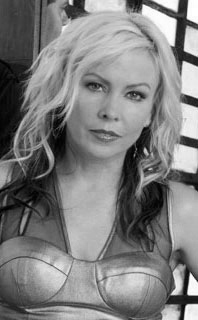 You started out as an
actress Ė I remember seeing you years ago on an episode of
Family. When did
you decide to make the jump from acting to singing?
You started out as an
actress Ė I remember seeing you years ago on an episode of
Family. When did
you decide to make the jump from acting to singing?
The universe, I guess it works in just
amazing ways. (laughs) My original idea wasnít to be an actor,
I wanted to be a musician. But I wanted it so badly that it scared the
shit out of me. To me, musicians and singers were gods. They were
people that were not like me. They were special. I didnít know if I
had any shot at all at it. I was fourteen [in] Santa Monica. A friend
of ours knew an agent and said, "Maybe you could do commercials or
something." She took me to this agent friend of hers, who was a
commercial agent. She had me read some copy there and somehow took an
interest in me and signed me.
I started doing commercials. Iím a vegan now, so
itís hilarious, my first commercial was [for] McDonaldís. (laughs again)
I was a kid in the family. I was 14, but I looked 10. It was for one
of their new shakes. I started doing a lot of commercials. I was
like: wow, this is fun. Because if you do a national commercial, itís
like Christmas every day. There are checks in the mailbox every day,
because itís running all the time and you get the royalties. Like, wow,
this is cool.
Then the commercial agent sent me out on a few TV
shows. She was trying to get into theatrical work as well. I started
getting into TV shows. I was like, wow, this is really cool. I was
extremely lucky. Extremely lucky. Because I know how hard it is for
people to get anywhere in that business. It was definitely hard. Itís
a hard business. I was constantly rejected. But it wasnít my original
idea.
That said, I learned so much from doing that, from
working in television. It taught me how to focus my emotions into a
very short period of time. With a song, itís even shorter. A scene can
be anything; it can be two minutes, it can be 20 minutes. But a song is
usually three minutes. I have to bring it and feel it and express it
and communicate it in three minutes. That was such a great discipline
for me, that I didnít know Iíd need, but now looking back, I really
needed it. I needed to learn how to do it.
Who were some of the
singers who inspired you to take up music?
Grace Slick was the first one that I can remember.
Mostly men, actually, because to me, men had a lot more fun in the
business than the women. Just all different kinds of men and styles. I
loved Jim Morrison. David Bowie. T-Rex. David Johansen. Cat
Stevens. Bryan Ferry. Then for women, Grace Slick. Ann Wilson Ė that
was later, that was like 1975 with the beginning Heart album. Stevie
Nicks. Bonnie Raitt, loved her.
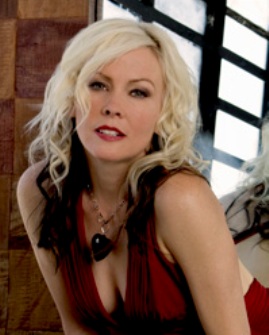 Years ago I
interviewed Toni Childs, who talked a bit about doing some singing for
an early incarnation of Berlin before you joined.
Years ago I
interviewed Toni Childs, who talked a bit about doing some singing for
an early incarnation of Berlin before you joined.
Thatís right. Yeah.
How did you hook up
with the band?
She was the first singer in the band. They started
looking for somebody else and answered my ad. I put an ad out at the
time. We didnít have internet, so it was a place in Hollywood that
youíd put your ad in and bands that needed musicians would go in and go
through the books and likewise. (laughs) Musicians would look
through for bands that were looking for musicians. I put an ad in
there.
At the time, John [Crawford] had already started
working with Toni. She was singing with the band. But she decided she
didnít want the band, she wanted to be a solo artist. She gave them
notice and they started looking for someone else. They answered my ad
because I said something about wanting something unique. I wanted
something different. And they were extremely different from everything
that was going on. We continued to be very different.
The
Pleasure Victim EP
was originally released on the old Enigma label, but when it was picked
up by Geffen it exploded with the hits "Sex" and "The Metro."
How surreal was it when suddenly the band were all over
the radio and MTV?
It was beyond any dreams that Iíd ever had. Yeah.
Everything was coming so fast. I mean, it seemed fast at the time.
When I first started working with John, it was 1979. We split up, or I
left; I had a problem with somebody else in the band, who was also
funding it. I left in í80. We were just slogging around in the clubs.
We were trying to get something going on. We started building a
following, but we didnít get [any record contracts]. (laughs) It was literally the
week I left that they got an offer from a German label to do the first
album. I was gone. They scrambled around
and found another singer [Virginia Macolino] and did it. It was called
Information. That was the first one. It didnít go anywhere
at the time.
After that album, John called me, because the whole
band kind of imploded and fell apart. He called me and he said, "Iíve
got these songs. I think you and I could really do something
together." I love John. Iíve never had a problem with John. I hadnít
found anything else. I was floundering around. So it was a great
call. We started working on the demos. Instead of flogging at the
clubs again, we worked to find somebody who might want to give us some
money to make the demos [into] an album.
What happened was, it was Enigma. They didnít give
us money to make the album, they put [the demos] out. They thought that
it was done. The demos became the album. It was fantastic for
everybody, because the whole album was maybe $3,000. Everything,
including the artwork. All of it. (laughs) And it went
platinum. Like, wow!
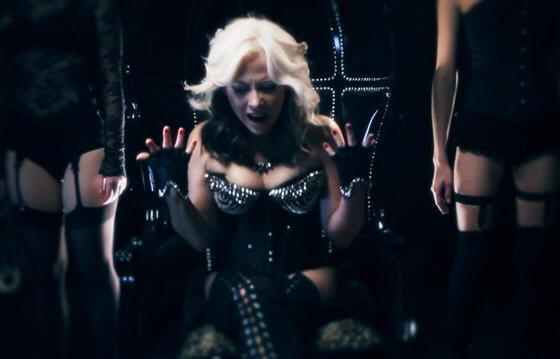 I think itís kind of
a nice thing that
Pleasure Victim
has actually aged so well compared to many new wave albums at the time.
People realize how good such songs as "The Metro," "Masquerade" and
"Tell Me Why" were. Does the fact that the EP is looked back at so
fondly feel like a justification of all the hard work you did?
I think itís kind of
a nice thing that
Pleasure Victim
has actually aged so well compared to many new wave albums at the time.
People realize how good such songs as "The Metro," "Masquerade" and
"Tell Me Why" were. Does the fact that the EP is looked back at so
fondly feel like a justification of all the hard work you did?
Yes, but it also feels like a gift. We work... I
can just speak for myself... Iíve worked just as hard on every album that
Iíve done. Iíve done, what? Eleven or twelve now. Thereís no way to
know which ones are going to hold together as an album. Or will stand
the test of time. Or wonít. I do my best. Some spark the interest of
the public. Some donít. Some are bigger. Some are smaller. They all
have their gifts. But that one seems to be one that... itís just one of
those albums that holds together really well. I think itís probably the
best one as an album that Iíve ever done. Except for Animal.
(laughs) And we donít know what Animal is going to do, or
how itís going to stand the test of time, or not. So I look at it as a
gift as well as a justification. That, wow, itís just kind of got a life
of its own.
Berlin hit just as MTV was taking off, and you had a look that played well for
the channel Ė videos like "The Metro" and "No More Words" became
classics. What was it like back in those days when video was just
exploding and you could do whatever you wanted? Like "No More Words" had
the Bonnie
and Clyde video. Also, do you feel your background as an actress
helped you make more memorable videos than some of your contemporaries?
Yeah, it helped me to be comfortable in front of a
camera. Thatís where music was going. That really helped us,
because a lot of people donít like doing camera stuff. That helped a
lot. It was a struggle to get people to believe in video. At the time
that Geffen came into the picture, one of the reasons we signed with
Geffen was because they did believe in video. David Geffen knew that
this was something that was going to stick around.
Amazingly enough, a lot of the other labels, they
wouldnít even give us a budget. In their offers to Berlin, they were
like: "No, video, no. Not going to happen. Itís a passing thing. MTV,
people will get tired of it." We were like: no, this is really cool.
(laughs) So Geffen won on that strength. They didnít offer the
most money. But they offered the most time commitment and they offered
belief in stuff that we wanted to do. One of them was video.
The MTV thing, I donít know what itís like now, but
you actually couldnít do everything that you wanted. Because they were
the only game in town, they told us what we could do. They would
literally like... we would submit a video and they would be, "Ehh, we
donít like this scene. Either take that scene out or weíre not playing
it." We were slaves to MTV. Everybody was. Because they decided what
would be played and what wouldnít.
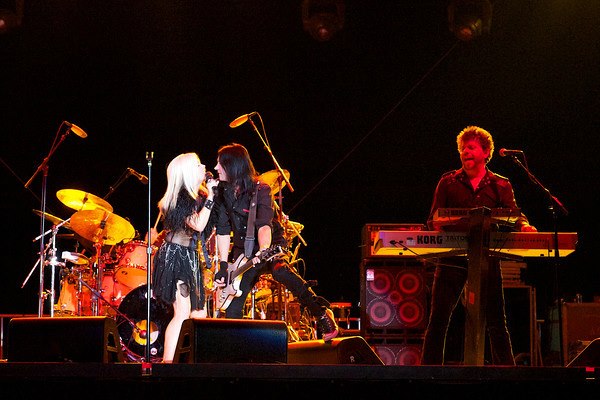 I remember the first Bonnie and Clyde that we
submitted to them, there was some shooting and they said, "We canít do
that. You canít have in the same shot a gun shooting and a person
falling down. So you just have to fix it." (laughs again) So
we kept going back and forth. And then the "Sex" video, oh, my God!
They were even upset about the food scene. Thereís a food scene where
people are sensually eating food and they were like, "You canít do
that. Iím sorry, no. That shot of that guy, the way heís licking
the... No, we canít do that."
I remember the first Bonnie and Clyde that we
submitted to them, there was some shooting and they said, "We canít do
that. You canít have in the same shot a gun shooting and a person
falling down. So you just have to fix it." (laughs again) So
we kept going back and forth. And then the "Sex" video, oh, my God!
They were even upset about the food scene. Thereís a food scene where
people are sensually eating food and they were like, "You canít do
that. Iím sorry, no. That shot of that guy, the way heís licking
the... No, we canít do that."
Just the fact that
you were an attractive woman as the leader of a band, and back then
there were not all that many women leading groups, I remember at the
time some of the snarky rock press would mix Berlin and your
contemporaries Missing Persons together derogatorily. Were you
surprised by the way you were being promoted and received back then?
I was surprised by the viciousness of it, sometimes,
yeah. John and I, we were 20, so pretty much most of our music was
about sex or love or finding either one. Or both. I was pretty blunt
and outspoken in the songs that I wrote about sex. So was John. I
think that surprised a lot of people. We said a lot of stuff that
hadnít been said before. People were like: What? They just thought,
well, clearly if youíre talking like that, youíre a bimbo. Or youíre a
sexual deviant. Or youíre a slut. Or youíre a nymphomaniac. Or
something. So, yeah, that surprised me. That because I was that
outspoken, the way I talked about it, that they took that stand about
it.
Berlin went from "Sex" to "Take My Breath Away" in just four years. As much
as I love that song, Iím not sure itís exactly representative of the
bandís music. Were you surprised by the direction that [songwriter and
producer] Giorgio Moroder took you all for the bandís biggest hit yet?
We loved him. We thought he was it. And he was.
He was amazing. So, for me, we already had a rift going on that end,
but for me Giorgio Moroder could have farted and I would done it. I
just loved [what he wrote]. Like John, I loved what John wrote. That
was one of the reasons that I could write lyrics and melodies to him and
sing the ones that he wrote. I just loved it. I loved working with
him. Same with Giorgio. When he brought that in, I just thought it was
great. I love romantic music.
John, on the other hand, he liked it. He couldnít
deny that he liked it. But he didnít like that he had not written it.
He felt in his 23-year-old life that it wasnít okay to do somebody
elseís songs in a band. You had to do your own stuff only. That
caused a lot of problems between us. And it caused a lot of problems
with the label, because they wanted to do it. This was attached to a
movie (Top Gun) coming out from Paramount with Tom Cruise, who
was huge at that point. Heís starring in it. And now John doesnít want
to do it? They were just up in arms with him. So it just became a
problem within the band and with the label. They said, "Well, youíre
doing it." (laughs) "Youíve got to do it."
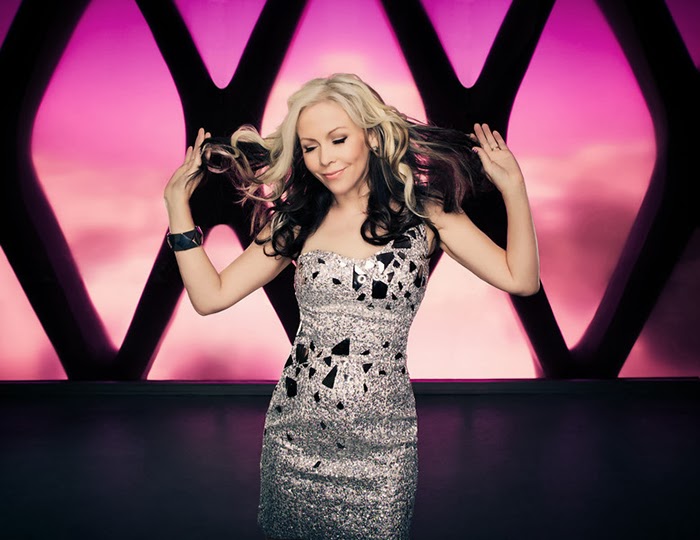 One of my favorite
Berlin singles was on the follow-up album to that hit,
Count Three & Pray, but "Like Flames" never quite took
off like your previous singles. Looking back, I think it may have been
a little more rock-oriented and kind of shocked the fans who just knew
Berlin for the Top Gun ballad. Were you disappointed that the
single and album never reached the audience they deserved?
One of my favorite
Berlin singles was on the follow-up album to that hit,
Count Three & Pray, but "Like Flames" never quite took
off like your previous singles. Looking back, I think it may have been
a little more rock-oriented and kind of shocked the fans who just knew
Berlin for the Top Gun ballad. Were you disappointed that the
single and album never reached the audience they deserved?
Yeah, and I blame myself a lot for the second point
that you brought up, which is the rock direction of the album. I wanted
to try that. John wanted to keep it more of what it was. So did the
label. I think my pushing for new frontiers for Berlin went too far. I
look at a band like Depeche Mode, who have also pushed the envelope with
their albums, but theyíve always kept the basic sound that they know
their fans like.
Now with my years of experience making music, I
understand that. I wish that I had given John more of what he wanted in
the production of that album, because I think it did alienate people.
They were like: "Well, whatís Berlin now?" We didnít sound much like we
had in the previous two albums. The other problem was that the label
was mad at us, rightly so, because we went to Europe and we recorded the
songs. It was so bad with this guy in England that we trashed the whole
thing. I think we kept one song, "You Donít Know," that he had done.
We started all over with Bob Ezrin, who did Pink Floydís The Wall.
Iím sure youíve heard of him.
Sure. He also did
Alice Cooper...
So we had to do the whole thing over. By the time
the album was done, we were $300,000 in debt to the label. They were
just pissed. (laughs) There wasnít a lot of [promotion]. They
just wanted out. They wanted to get rid of us. It was tough.
Was that why the
break-up happened?
Yeah.
I know in the early
90s, you released your solo album,
Moment of Truth. After working in a band situation for
so long, what was it like to call the shots?
That was probably the worst experience of an album
that Iíve ever had. Again, a lot of that was my doing. (laughs)
Because once I was released from Berlin, I was like: I want to try
everything! I want to do dance. I want to do rap. I want to do
country. I want to do pop. I want to do rock. I want to do weird
alternative stuff. I mean that album was everything. And it was so
everything, it was a mess. It was just like: well, what is this girl?
(laughs again) What does she want to do? That deal further
alienated people.
Plus I didnít have the band around me to tell me,
"Hey, this is a mess. We need to focus on something that people can
just grab onto and relate to." It was just me. And hired guns. I learned
that was also a pitfall, because nobody cared as much as I
did. They were paid either way. I learned that having people that
were partners, there is a real asset to that. The fighting is good.
Arguing can be good, because people care.
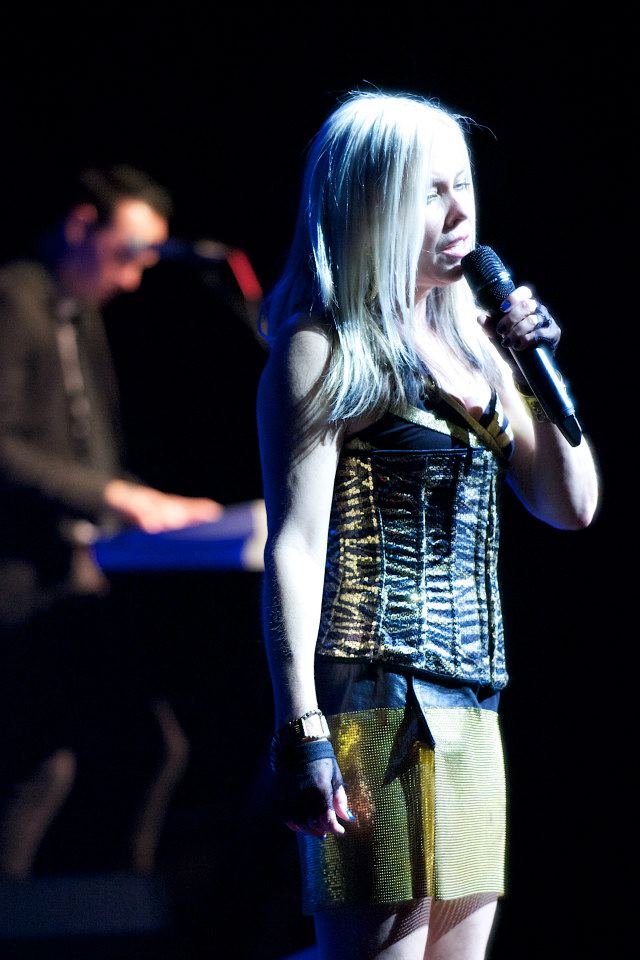 You reformed Berlin
in 1999 Ė I actually was at one of your gigs at Rhinoís Retrofest in
Santa Monica and met you backstage there. One thing I like about the
reformed band is you play to all your strengths. On your new album
Animal,
the title track shows the rockier side of Berlin, the new wave side
shows up in stuff like "Donít Make Me Regret It" and you even have the
pretty ballads like "Itís the Way" and "Blame It On the World." Were
you looking to play with styles on the album Ė but keeping it in check
unlike the solo album Ė or is it just how everything came out?
You reformed Berlin
in 1999 Ė I actually was at one of your gigs at Rhinoís Retrofest in
Santa Monica and met you backstage there. One thing I like about the
reformed band is you play to all your strengths. On your new album
Animal,
the title track shows the rockier side of Berlin, the new wave side
shows up in stuff like "Donít Make Me Regret It" and you even have the
pretty ballads like "Itís the Way" and "Blame It On the World." Were
you looking to play with styles on the album Ė but keeping it in check
unlike the solo album Ė or is it just how everything came out?
Yeah. I think Animal as an album is a lot
more focused than either Count Three and Pray or the solo
album...
Oh yes, definitely...
If I were to put it in any category, itís mainly EDM.
Itís mainly electronic dance music. Thatís what I really am into right
now. I just love where electronic music has gone. In that direction,
Iím probably listening to more artists than anywhere else. Plus,
because I hear how people are using both early sounds and sounds like
Skrillex, [that] Iíve never heard before. Theyíre kind of melding it
all together. I knew there was a place for Berlin within this style,
because all the sounds are still being used that we started with.
I noticed in
Animal the
lyrics tended to still be pretty sexually charged. We are all getting a
little older. Is that sort of a hallmark of the bandís style?
Well, itís who I am. (laughs hard) I donít
know if itís right.
You worked with Billy
Corgan of Smashing Pumpkins on your
Voyeur comeback album back in 2002. Over the
years youíve worked with lots of other artists people wouldnít
necessarily guess, Gilby Clarke [of GunsíNíRoses], Charlotte Caffey [of
The Go-Goís], even Ted Nugent. What do you look for in a collaborator?
Loving their music. Iím a reactor. I donít sit and
write lyrics just for fun. To me, they are nothing unless they are
attached to some music. What inspires me is music. I tend to ask
people whose music really turns me on to work with me. Then I can take
that music and fit lyrics to that. To me, the music itself is what
calls out to what it is about. I grab maybe a line, or a verse and a
chorus maybe, that I played with one day and threw in a drawer. Like: Oh,
that fits this! Then Iíll finish it and fit it to the music that
Iím working with.
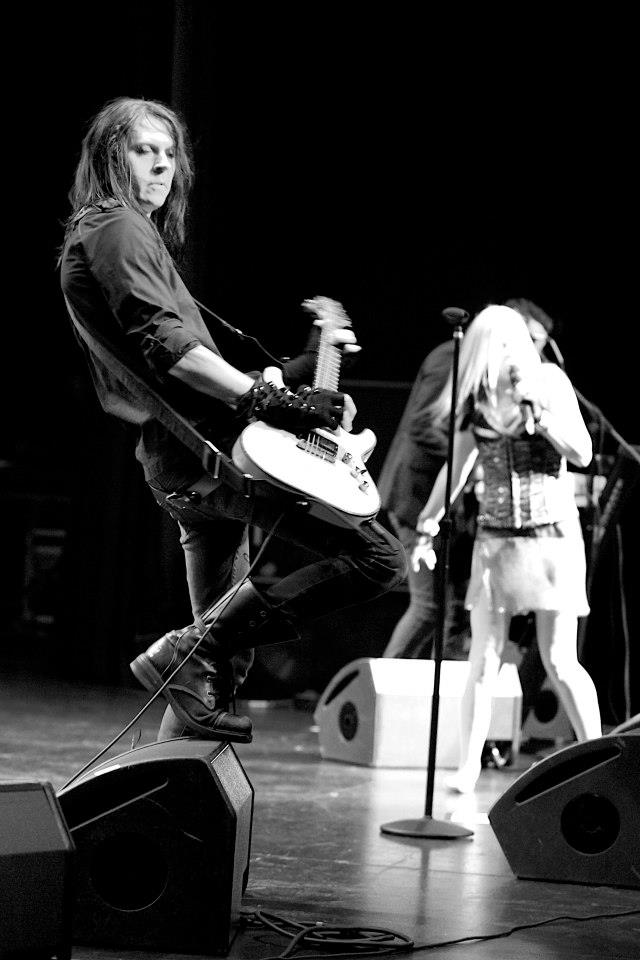 At this point, the
new Berlin has released more albums than the original incarnation. How
surprising is that? Have you gotten more and more comfortable with the
new version?
At this point, the
new Berlin has released more albums than the original incarnation. How
surprising is that? Have you gotten more and more comfortable with the
new version?
I am, actually. Thanks for noticing that. I just
realized the other day that my drummer Chris [Olivas] has been in the
band longer... thatís been the longest partnership Iíve had with
anybody. [Even] John. John was 13 years and now Chris is 14. He
joined the band in 2000.
What do you think of
the current state of the music business? The label system Berlin came
up in is obviously broken, with low sales, piracy and ridiculously small
streaming royalties, but young acts do have many more outlets to get
things out there. Do you think that a band like Berlin could have
gotten an audience in this atmosphere?
I have no idea. I know, itís frickiní hard now.
Iíve got a lot of friends with kids who are starting in bands and
playing the club scene and getting a following, and oh my God, I hear
that they have to pay to play? We didnít have the money for that.
(laughs) We didnít make much, but we would get something.
Then we would just plow it back into the band to keep building it.
But now, they donít get anything. The clubs around
LA at least are like, "Well, weíll give you a stage. You get people in
here and weíll give you a place to showcase yourself." Whoa! How do
people do it? I donít know how. Because youíve got to eat. Youíve got
to live. We all had day jobs, and I was doing different television
things here and there to keep food on my table. But, wow! Itís not
easy these days.
There is a video on
YouTube that shows you and Harrison Ford doing an extensive screen test
for the original
Star Wars in which
you were up for the role of Princess Leia. What was the story behind
that, and how different do you think your life would have been had you
gotten the role?
Completely different. I would not have the luxury
of this job. No way. It wouldnít have happened. In those days, people
didnít transfer. People who tried to sing who were actors were looked
down on. Like, nah, youíre not a singer. It was very segregated.
Nowadays it happens all the time. Television is the new record label,
really. Itís just the best place to get the biggest audience the
quickest. But not in those days.
So, yeah, I would be an actor. I credit my mother
[for helping me decide], because it was shortly after that the show
called Dallas came up. The casting director had known me from
something else. She brought me in and they just offered it to me. I
didnít need to audition. It was handed over like, "Okay, here. Seven
year contract. This a new show. We donít know if it will go for seven
years, but you have to sign this. Do you want it?" It was the Charlene
Tilton role.
I was just absolutely terrified. I was I think 17. I went home to my mother and I said "Mom, what should I do? If I
do this, then there isnít going to be any music career." She said,
"Well, if you really want to try the music thing, youíre going to regret
it if you donít." And everybody dropped me. Everybody. When I went to
my agent and said Iím not doing the series, he said, "Are you out of
your fucking mind?" So he dropped me. He said, "Youíre not serious."
And I had nothing. I had nothing to lose either (laughs),
because I had nothing.
But it ended up
working out for you.
Exactly. A year later, I met John and everything
started happening really quickly. So, yeah, it was very lucky. Iím
still grateful to my mother for being the only one to believe in me,
because without her, Iíd probably be in a job that I didnít like.
What would people be
surprised to know about you?
That Iíve been afraid of people my whole life.
Thatís not something I really faced until a couple of years ago.
Really, the song "Nice To Meet You" [on Animal] is about that. I
just never said those words to myself, but when I started writing the
lyric to that song, I realized that thatís whatís been going on. I
used music to be a connector with people, because it feels safe.
Because I love music. And other people do, too. When music playing, or
Iím singing, or Iím in an audience, or whatever, I feel connected with
people through the conduit of music.
When itís not there, I avoid people. Letís say more
in the past, I avoided people. I never felt comfortable at parties. I
felt completely scared and didnít know how to talk, or be social, or any
of that. I donít think people realized that. They wouldnít think that
because my job is to communicate with people. (laughs)
No, you donít come
off as shy. That is surprising. What kind of things make you
nostalgic?
Music. Music, songs. The other day I was charging
my electric car and we went to a place up the street and this song came
on: (sings) "And the colored girls sing, doo doo doo doo doo doo
doo doo doo, doo doo doo doo doo doo doo doo doo..."
"Walk On the Wild
Side" by Lou Reed, yeah.
I was just remembering. It instantly put me where I
was when that song came out. We were in a record store. I was
[a little girl]. I was running the cash register. I was helping in the
store. I got to play any songs I wanted. Oh my God, total nostalgia.
Itís such a beautiful thing. Because music, youíre just right back
where you were. Who you were, where you were. You remember
everything.
"The Metro" always
reminds me of being in college, so I know exactly what you mean.
Overall, how would you like for people to see your career?
Hopefully, Iíd like it
to be as an inspiration to do what they really love to do.
What they really want to do. Because Iím not special. We were in a
lower-middle-class family. Lived in apartments my whole life. Had to
move every two or three years. (laughs) There is no reason
why I would have been successful over anybody else. It was just wanting
it and sticking with it. Living through the hard times. Believing in
it. Believing in myself. Surrounding myself with people who believed
in me enough to keep going. Anybody can do that. So thatís what I
hope, that it inspires people to do whatever it is theyíre wanting to
do.
|
CHECK OUT TERRI
NUNN & BERLINíS VIDEO FOR THEIR NEW SINGLE "ANIMAL"!
|
Email
us Let us know what you
think.